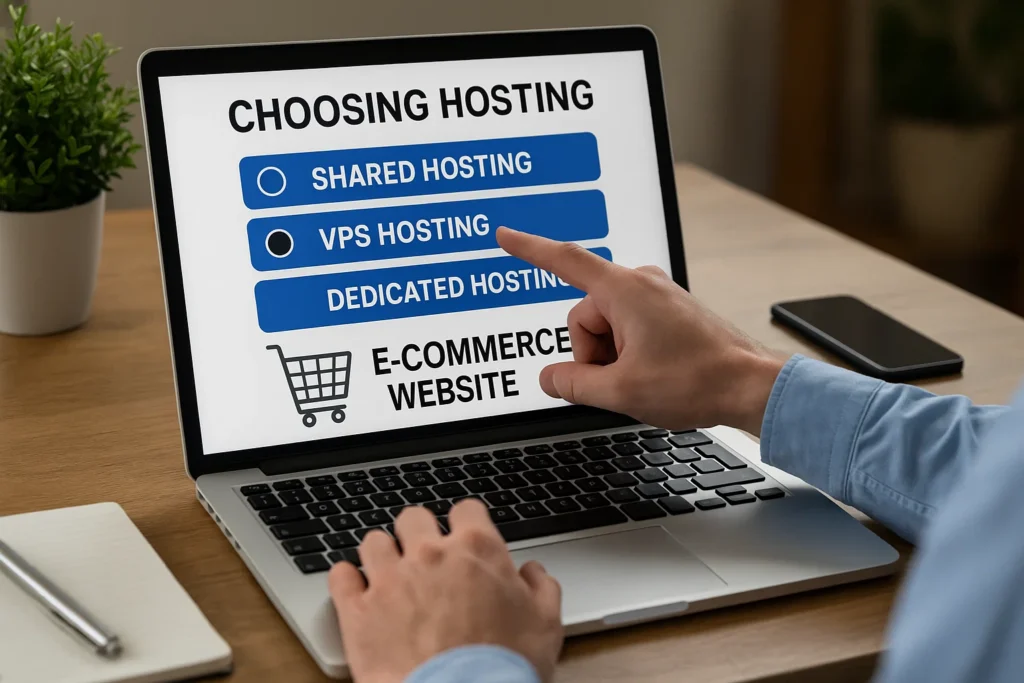Running an e-commerce business in today’s competitive digital landscape is no easy task. Every decision you make—right from choosing the right products to developing a user-friendly storefront—affects the success of your online store. However, one of the most overlooked but crucial elements of building and sustaining a profitable e-commerce website is web hosting.
The hosting service you choose plays a pivotal role in determining your site’s performance, security, scalability, and ultimately, your customer satisfaction and sales.
In this comprehensive guide, we will explore what makes e-commerce hosting unique, the types of hosting solutions available, the key factors you should consider before committing to a provider, and how to match hosting plans with your business’s current and future needs. By the end, you will have a clear framework to make an informed decision and ensure your e-commerce store runs smoothly, securely, and profitably.
Why Hosting is Crucial for E-commerce Success
For most websites, hosting simply determines whether the site is online and accessible to users. But for e-commerce, it goes much further than that. Unlike personal blogs or simple company websites, an online store must deal with payment gateways, high traffic spikes during sales seasons, inventory management, customer accounts, sensitive data, and a need for 24/7 uptime.
A poor hosting choice can result in:
- Slow loading times that frustrate shoppers and increase bounce rates.
- Downtime during peak hours, costing you valuable revenue.
- Security breaches that compromise customer trust and violate data protection laws.
- Limited scalability, preventing your store from handling growth.
On the other hand, a well-optimized hosting plan ensures faster page loads, seamless transactions, robust data protection, and the flexibility to adapt as your business grows. In e-commerce, where every second and every click matters, hosting becomes the backbone of your digital storefront.
Key Factors to Consider When Choosing E-commerce Hosting
1. Performance and Speed
Website speed directly impacts user experience and conversion rates. Studies show that even a one-second delay in page load time can reduce conversions significantly. Your hosting provider should guarantee solid performance through powerful servers, caching technologies, and Content Delivery Networks (CDNs). Look for providers offering SSD storage, optimized databases, and low latency connections.
2. Uptime Guarantee
Downtime equals lost revenue in e-commerce. A reliable hosting provider should offer at least 99.9% uptime guarantee. Some high-end providers go further, offering Service Level Agreements (SLAs) that compensate you for downtime.
3. Security and Compliance
An e-commerce site handles sensitive customer information, including credit card data. Hosting must support SSL certificates, firewalls, DDoS protection, malware scanning, and automatic backups. Compliance with standards such as PCI DSS (Payment Card Industry Data Security Standard) is also crucial if you’re processing payments directly on your website.
4. Scalability and Resources
E-commerce businesses often experience fluctuating traffic, especially during promotions or festive seasons. Your hosting plan should allow you to scale resources easily, such as CPU, RAM, and storage, without affecting site performance. Cloud-based hosting often excels here.
5. Technical Support
Since e-commerce operates around the clock, your hosting provider’s 24/7 support becomes vital. Choose a host with reliable support channels like live chat, phone, or ticket systems, and ensure they have expertise in handling e-commerce-specific challenges.
6. Server Location and CDN
Your server’s location should ideally be close to your primary customer base to minimize latency. A CDN distributes your content across multiple locations worldwide, ensuring faster delivery regardless of where your customer is shopping from.
7. Cost and Value for Money
While cheap hosting may seem appealing at first, it often lacks the features and reliability e-commerce demands. Balance cost with essential features, long-term growth, and hidden charges for add-ons like SSL, backups, or migration.
Types of Hosting Options for E-commerce
E-commerce businesses can choose from various hosting solutions, each with its pros and cons. Let’s break them down:
1. Shared Hosting
Shared hosting means multiple websites are hosted on the same server, sharing resources. It is the cheapest option but often not ideal for e-commerce due to limited performance, scalability, and security. Smaller stores with low traffic may start here, but growth will require upgrading.
2. Virtual Private Server (VPS) Hosting
VPS hosting provides a dedicated portion of a server with allocated resources, offering more control and stability compared to shared hosting. It’s a good middle-ground for growing e-commerce stores that need more power without the high cost of a dedicated server.
3. Dedicated Hosting
Dedicated hosting gives you an entire server exclusively for your website. This ensures maximum performance, security, and customization but comes at a higher cost. It’s ideal for large e-commerce businesses with heavy traffic and complex requirements.
4. Cloud Hosting
Cloud hosting uses a network of interconnected servers to host your site. It provides excellent scalability, flexibility, and reliability, making it one of the best options for e-commerce. You can scale up resources during peak demand and scale down when traffic drops, paying only for what you use.
5. Managed WordPress or E-commerce Hosting
For businesses using platforms like WooCommerce, Shopify, or Magento, many providers offer managed hosting solutions tailored to these platforms. These plans often include automatic updates, performance optimizations, and enhanced security features, reducing the technical burden on business owners.
Hosting Requirements for Popular E-commerce Platforms
Different e-commerce platforms have varying hosting needs. Understanding these will help align your hosting choice with the software you plan to use.
- WooCommerce (WordPress): Requires PHP, MySQL/MariaDB, SSL, and sufficient memory. Managed WordPress hosting often works best.
- Shopify: Hosting is included in the subscription, but speed and performance depend on Shopify’s infrastructure.
- Magento (Adobe Commerce): Known for its heavy resource demands, Magento needs VPS, cloud, or dedicated hosting with powerful CPU and RAM.
- BigCommerce: Like Shopify, it includes hosting within its package.
- Custom-built Stores: Require flexible hosting solutions that can handle custom frameworks, usually cloud or dedicated servers.
Balancing Cost with Features
When choosing e-commerce hosting, one of the biggest dilemmas is cost versus features. Many businesses start small, but as they grow, hosting needs to scale up. Think of hosting as an investment rather than an expense. Spending slightly more on reliable hosting often pays off by preventing downtime, improving conversions, and building customer trust.
Budget hosts might not provide adequate resources or support, which could harm your store in the long run. Instead, focus on hosting providers with transparent pricing, scalable plans, and proven reliability.
Security Best Practices in Hosting
While hosting providers include security features, store owners must also adopt best practices to safeguard their e-commerce sites. These include:
- Enabling two-factor authentication for admin accounts.
- Using regular automated backups stored offsite.
- Keeping all plugins, themes, and software updated.
- Installing a web application firewall (WAF).
- Monitoring logs and traffic for unusual activity.
A secure hosting provider combined with proactive measures ensures customer trust and compliance with regulations.
The Role of Hosting in SEO and Conversions
Search engines like Google prioritize websites with faster load times and higher uptime. Hosting directly affects SEO rankings, which in turn influence your visibility and sales. A slow website frustrates users and increases bounce rates, reducing conversion opportunities.
Furthermore, features like SSL certificates, secure transactions, and mobile-friendly performance signal trust to both customers and search engines. Choosing the right hosting provider can therefore indirectly increase organic traffic, improve conversions, and maximize ROI.
Future-Proofing Your Hosting Choice
E-commerce is a fast-evolving industry. Trends like AI-driven personalization, augmented reality shopping, and blockchain payments are shaping the future. To stay competitive, your hosting must be flexible and adaptable. Providers offering cloud infrastructure, managed solutions, and integration with the latest technologies will help future-proof your online business.
It is wise to choose a hosting provider with a strong roadmap, proven reliability, and the ability to scale effortlessly as technology and consumer expectations evolve.
Final Thoughts
Selecting hosting for your e-commerce website is not a decision to be taken lightly. It impacts everything from site speed and security to customer trust and long-term growth. While there is no one-size-fits-all solution, aligning your business needs with the right hosting type—whether VPS, cloud, dedicated, or managed—will set a strong foundation for success.
Invest in hosting that offers performance, uptime, scalability, security, and excellent support. Treat it as the backbone of your business, because in many ways, it is. A reliable hosting environment not only supports your current operations but also empowers your store to expand, innovate, and thrive in the ever-competitive digital marketplace.
In short, the right hosting is not just about keeping your website online; it’s about building trust, ensuring smooth transactions, boosting conversions, and paving the way for future growth. By making an informed choice today, you’re securing the long-term success of your e-commerce business tomorrow.

